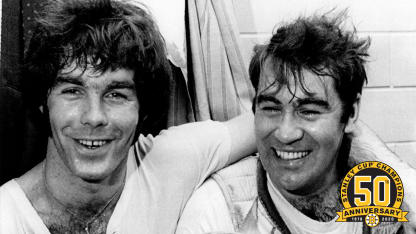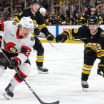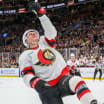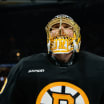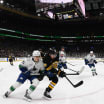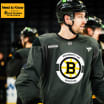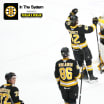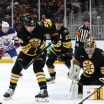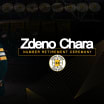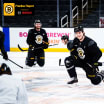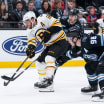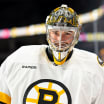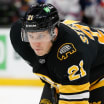BostonBruins.com -There has, perhaps, never been a greater character - and storyteller - in the history of the Boston Bruins than Derek Sanderson. The eccentric center, the winner of the 1967 Calder Trophy as the NHL's best rookie, became one of the most beloved athletes in the city's sports lore.
Sanderson, the man who delivered the pass to Bobby Orr on the Stanley Cup-clinching goal in 1970, was not just an athlete, however. His popularity reached heartthrob and rock star status from the moment he arrived on the scene in 1966.
And as the team celebrates the 50th Anniversary of its 1970 Cup championship, Sanderson sat down to remember some of the best stories and anecdotes from that era during a 45-minute virtual town hall with season ticket holders and media on Tuesday afternoon.
Here's a recap of some of Sanderson's best memories.
Town Hall Q&A | Derek Sanderson
Center from 1970 Cup champs talks 'The Goal' and much more during chat with season ticket holders, media
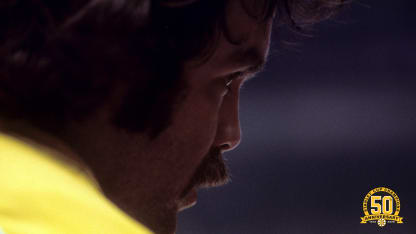
ON 'THE GOAL'
What is one story from 1970 that people might not know?
Well, that might be tough. Fifty years, we might have pretty well covered it all. But I wore a tuxedo that night - St. Louis, they're not gonna beat us, so I wore a tuxedo to the Garden. The guys said, 'Oh, what are you doing?' They had the Stanley Cup there and everything. Nobody expected it to be that close. Teddy Green said to me, 'What are you gonna do if we lose this?' I said, 'I never thought of that. I'll wear a sweatshirt home.'
What do you remember from the clinching game?
Everybody likes to say it was a foregone conclusion. I was really happy that it was as close as it was. What? 3-3 at the end of the third? Bobby Orr had a Cinderella year. Not that it was a fluke, but he did everything right, took it to another planet. For him to get that goal, Bobby, I was so happy. He did everything for everybody and it came to him. I said, 'This is great.' I'm glad he didn't miss the pass. That's good…there was nobody behind him but St. Louis Blues players.
What do you remember from the goal itself?
Once we got it in their end zone, they never got it out. Donny Awrey made a great play to keep it in or they would have broken out earlier. Then it was over pretty quickly. Bobby took a chance along the wall and just boom. [Blues defenseman] Jean-Guy Talbot should never have come to me…if you're the defenseman, you're not gonna go behind the net. And he did. When he reached that was it. That was all I needed, just a little opening.
Wasn't somebody a little upset that you were starting overtime instead of him?
Phil [Esposito] might have been a little upset. But [head coach] Harry [Sinden] came to me at the end of the game and said, 'Listen, usually these things end pretty quickly. The only chance they got is if it ends quickly so let's get them in a couple of minutes.' Remember, in those days we used to play a minute-and-a-half shift. Get us past the opening and I can double you back and make it a defensive battle and eventually you're gonna win because we were that much better. We were really deep. He started me and I sat beside Phil. Phil was on my right and he goes, 'I can't believe that.' I said, 'Well, what are you gonna do?'
Did you know the pass to Orr was going to work out?
No, no. You make the play and hope it works. Jean-Guy Talbot should never have come to me and when he came to me and poke checked me and flipped it over, the rest was up to Bobby. That puck had to land flat, but he never held it, he just redirected it, really. I was pumped. I saw it hit the back of the net and I said, 'Well, that's it, I think.' I never really reacted right away. It's kind of like in the NFL, you're waiting for a penalty flag, 'Is everything OK?' And it was. It was a lot of fun, an exciting moment, a great time. We just didn't realize how popular we were at the time. The people were really good. We had great fans, the same type of fans today. We had great fans. We were lucky.
How close has the 1970 remained over the years?
I live across the street from Bobby. The guys, we always get together. It was a team that, there was no one there that you didn't like. It's hard to believe. There was 20-something guys and everybody liked everybody. And everybody knew if you were in a mood, if you had an attitude. They'd just shake you off. They were great. We had a great team of guys that cared about each other and we had a rule that no one would be in a fight alone. If we got in a fight, the closest Bruin would fight the other guy. It was gang tactics most of the time. Then they put the third-man-in rule in.
When you see the photo of 'The Goal' today, what goes through your mind?
What goes through my mind is that Bobby scored the goal a good second before Noel Picard lifted his feet up. Bobby ended up parallel…I was amazed that that [photographer] caught it right at that moment. They did a study on the top 10 sports pictures of the century and that picture won it. I always think of Picard tripping him. It would have been a ho hum goal if Picard didn't trip him.
Do you have a favorite off-ice story from the Big, Bad Bruins era?
One of the good stories is Esposito in the [hospital] bed and I wasn't a part of that. I was just a fan when the guys did that one, when they brought Esposito out of the hospital room. He blew out his knee, was getting operated on. He was in traction. And they went to see Phil. Phil said, 'Geez, where we going?' They said, 'We're going for a beer.' Phil said, 'What a shame, I'm stuck here.' [Wayne] Cashman said, 'No, you're not.' They wheeled the bed out, the whole nine yards. Crossing the street, up to the Branding Iron. I couldn't picture it. I got blamed for it, but I never did it. I thought that was a great move…Cash wheeled him out of there. [Gary Doak] was there. Dallas Smith, Teddy Green, there was a few of them. Bobby wasn't there, he wouldn't do something like that.
Who was an unsung hero on the 1970 team?
Ace Bailey. Garnet, he was fast. There was a lot of players along the way that came up and down. Donny Marcotte should have got a lot more attention than he did. You could trust him. You knew exactly what he was capable of and he always did it. Those are the guys. Eddie Westfall. Eddie and I got a lot of kudos for being penalty killers…they were tremendously talented people, they just never get enough credit.
Sanderson Answers B's STH Questions
ON HIS CAREER
How hard was your famous sweep check and could it be taught today?
That sweep check, I'm telling you, the perfect guy, perfect, for that is Brad Marchand. He's got complete stick control…when you're coming into forecheck somebody and they go left to right, no, go right at them and drop your stick. It's a 50-50 chance you'll get it, right? I always thought, man, Marchand's talent and ability, he could do that easily. Would give himself a lot more opportunities.
You were such a great penalty killer and face-off man. Did anyone in the NHL rival you?
There was a few good guys, smaller people. [Vancouver Canucks forward] Bobby Lalonde was 5-foot-4. He actually cut with a saw and sawed off his shin pads because the normal ones wouldn't fit him. But they're on top of you, they've got all the leverage. It's a little more difficult with shorter people. [Chicago Blackhawks forward] Stan Mikita was good, [Montreal Canadiens forward] Jacques Lemaire was good, a great centerman.
My dad made me do that when I was a kid, when I was young, playing bantam, 11-12 years old. He had me pay attention to every face-off. You're a centerman, if you win them all…an average of 92 back in the day…a lot of face-offs and you win every face-off back to your defenseman who then turns back a little bit and passes to his partner, you're gonna have the puck - my father used to tell me - a good seven, eight minutes more than the other team and that's a good thing.
ON HOCKEY
What current Bruins do you appreciate when you watch the games?
Brad Marchand is a player that's gritty, he's in your face, he's got a great pair of hands. [Patrice] Bergeron has a great pair of hands, he's as good as anybody in the game two ways, up and down. [They've] got some great players. And surprisingly [the lesser known players] are really playing really well. I like that. I like that they go in and get involved. I like the Bruins. I've watched them for a long time and Marchand is my favorite. I watched him, I think it was his first training camp. It was an exhibition game and he lost the puck behind the goal line, and I don't know how he did this, but he cut back out and roofed it over the goalie's shoulder and hit the crossbar - a fabulous move. I said, 'Wow, this kid's got talent.' And he's never ceased to amaze me since.
What has Harry Sinden meant to the Bruins organization over the years?
There is not a finer, smarter hockey man in the history of the game. Harry Sinden was a genius. Remember in our day, there was only one coach. One coach and a trainer. The game is meant to be played with 16 guys - 10 forwards, three lines and an extra; two D pairs and an extra. That was it. In case you had an injury or a bad game. But Harry Sinden, there was nothing he did not think of. I never went into a game that Harry Sinden didn't give me something to think about. When you come to a game and you think you're prepared, you're not.
He just loves the game. He cares that much about his players, he never called us by our nicknames. Never. It wasn't Turk, it was Derek and it was Phil. He didn't say Pie for Johnny McKenzie, he'd say John…he was the best - the best. Get a hold of Harry and write a book. I'm telling you, the things he knows about the game…he was a really, really good coach and a good person.
Which team did you hate the most to play against?
Montreal. Really, I hated Montreal. I had a lot of fun with the Rangers, but Montreal was the most difficult place to play in the first 10, 12 minutes. In Montreal, wow. I didn't think a team could come out that hard every time. They always had talent.
What did the Gallery Gods mean to you?
They were the key to the enthusiasm. The old Garden was three tiers…the third balcony was hanging right over you. They were only about 100 feet, 120 feet away. I tell you, every face-off when we were down or not playing well, they'd let you sleep for eight or nine or 10 minutes in Boston. Then, 'OK, what are you guys doing?' Those fans were comedians. Always one guy had a catchphrase. I never thought of what to say in those moments. Always somebody said something to make you laugh.
The involvement of the fans was really important. We needed them and they appreciated us. All Boston's ever asked is that you work hard. Come with a little grit and work hard. If you work hard, they're not gonna throw rocks at you. That crowd was the best anywhere…we kind of matured together. A great hockey town.
